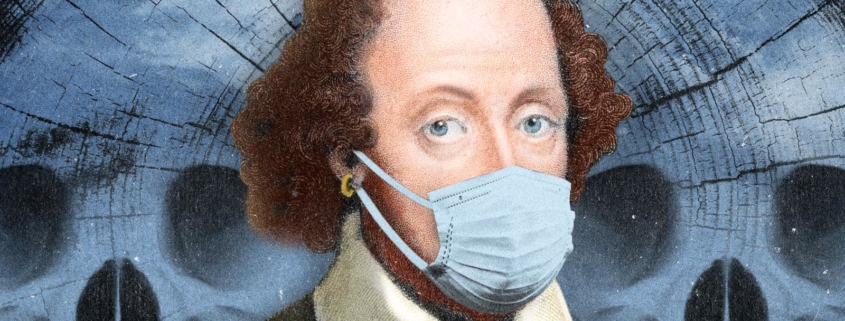Mutability: the plague in Shakespeare
One of the best known sentences in Shakespeare, indeed in all of literature, is Mercutio’s curse as he dies at Tybalt’s hand: “A plague on both your houses”.
And one of the major reasons for the deaths of both Romeo and Juliet is the failure of Friar Laurence to let Romeo know the details of his plan. Some time after Romeo was due to meet Juliet at the tomb, Friar John, a fellow Franciscan, explains that on his way to take the message to Romeo he was prevented from reaching Mantua where Romeo was holed up:
… the searchers of the town
Suspecting that we both were in a house
Where the infectious pestilence did reign,
Sealed up the doors and would not let us forth
So that my speed to Mantua there was stayed. (R&J 5,2,8-12)
And when Laurence asks who took the letter to Romeo, John gives the answer which is the literal key to the ultimate suicides of the lovers:
I could not send it – here it is again –
Nor get a messenger to bring it thee,
So fearful were they of infection. (R&J 5,2,1-16)
Apart from these two references the plague does not appear on the surface of Romeo and Juliet. Yet it was a threatening shadow throughout Shakespeare’s life and bubbles to the surface of his work with regularity. In the year of his birth the town of Stratford-upon-Avon recorded his baptism and the death by plague of a young apprentice, and in the margins of the latter was written hic incipit pestis, or here begins the pestilence.
Not much was known about the plague at the time. It came without warning. No one knew what caused it or how to treat it other than through the instinct to stay away from people with the symptoms: fever and chills to start with, weakness and vomiting, bleeding from everywhere, and swollen lymph nodes in the armpits and groin (buboes – thus ‘bubonic’). Death was agonizing.
People lived with the plague in the way we never quite managed to live with our own pestilence, Covid-19. They took all manner of folk precautions, like burning herbs. That was not an unreasonable thing to do, of course. And some of those habits found their way through to the literature of the time.
It is hard to know how Shakespeare and his fellow theatre people dealt personally with the constant threat of plague. Public places including theatres were closed for long periods of time during outbreaks, and as a shareholder whose living depended largely (if not completely) on his earning, Shakespeare would have found the plague deeply threatening and frustrating. And between the closures we know they were constantly aware of it, and although Shakespeare did not make a central issue of it others did. I remember falling in love with a poem, “A Litany in Time of Plague”, by one of Shakespeare’s contemporaries, Thomas Nashe, a relatively unsung poet and dramatist. He wrote the poem in 1593 after London had been ravaged by plague. It contains a line that has haunted me since I first read the poem some 50 years ago..This is an excerpt:
Rich men, trust not in wealth,
Gold cannot buy you health;
Physic himself must fade.
All things to end are made,
The plague full swift goes by;
I am sick, I must die.
Lord, have mercy on us!
Beauty is but a flower
Which wrinkles will devour;
Brightness falls from the air;
Queens have died young and fair;
Dust hath closed Helen’s eye.
I am sick, I must die.
Lord, have mercy on us!
The plague turns up regularly in Shakespeare’s plays as the vehicle of a simile or metaphor. “Thou art a boil,” Lear tells his daughter Goneril, “A plague-sore, or embossed carbuncle / In my corrupted blood.” “Be as a planetary plague,” says Timon in Timon of Athens, “when Jove / Will o’er some high-viced city hang his poison / In the sick air.” And in Coriolanus the eponymous general shouts at the plebeians: “All the contagion of the south light on you / You shames of Rome, … You herd of—Boils and plagues / Plaster you o’er, that you may be abhorred / Farther than seen, and one infect another / Against the wind a mile.”And the plague gives us a tour de force in Twelfth Night when Olivia equates it with love, or vice versa:
Even so quickly may one catch the plague?
Methinks I feel this youth’s perfections
With an invisible and subtle stealth
To creep in at mine eyes. (Twelfth Night, 1,5, 265-8)
And in Much Ado About Nothing Beatrice uses this pestilent vehicle wittily to make fun of Benedick. In the opening scene of the play beatrice asks the messenger where Benedick is, and he replies that Benedick “is most in the company of the right noble Claudio”, to which Beatrice replies:
O Lord! He will hang upon him like a disease. He is sooner caught than the pestilence, and the taker runs presently mad. God help the noble Claudio. If he have caught the Benedick it will cost him a thousand pound ere he be cured. (Much Ado, 1,1,120-4)
While the plague in name bubbles irregularly through the surface of the plays, all of Shakespeare’s work develops its characters and relationships in the context of deep and widespread social disruption. The Shakespeare historian Stephen Greenblatt points us toward Macbeth, which was written during one of the most intense periods of the plague. When Macduff asks Ross how Scotland is faring under Macbeth, Ross answers
Alas, poor country,
Almost afraid to know itself. It cannot
Be called our mother, but our grave, where nothing
But who knows nothing is once seen to smile;
Where sighs and groans and shrieks that rend the air
Are made, not marked; where violent sorrow seems
A modern ecstasy. The dead man’s knell
Is there scarce asked for who, and good men’s lives
Expire before the flowers in their caps,
Dying or ere they sicken. (Macbeth 4,3,189-198)
In Elizabethan English, as Greenblatt says, the word “modern” meant something like trivial, as when a character in All’s Well That Ends Well says “They say miracles are past; and we have our philosophical persons, to make modern and familiar, things supernatural and causeless. Hence is it that we make trifles of terrors, ensconcing ourselves into seeming knowledge, when we should submit ourselves to an unknown fear.” “Ecstasy” meant any extreme degree of feeling, the state of being beside oneself. The upshot then is that the violence of emotion, the affliction of countless deaths, has become the way of life for people for whom the plague was a situation that, as far as anyone knew, had no end. Shakespeare’s genius, not just here but throughout his work, was to make a metaphoric comparison between the effect of the plague on society and everyday life, and the effect of tyrannical government.





Leave a Reply
Want to join the discussion?Feel free to contribute!